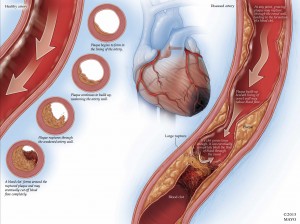-
Deaths From Heart Disease Declining Among Rheumatoid Arthritis Patients
Rheumatoid arthritis patients are twice as likely as the average person to develop heart disease, but a new study shows that efforts to prevent heart problems and diagnose and treat heart disease early may be paying off. Despite the heightened danger, deaths from cardiovascular disease among people with rheumatoid arthritis are declining, the research found. The study was among Mayo Clinic research being presented at the American College of Rheumatology’s annual meeting in San Francisco.
Other Mayo studies discussed at the conference chronicled a significant increase in gout; examined rare intestinal microbes in rheumatoid arthritis patients; and discovered that people with rheumatoid arthritis use opioid painkillers at a h igher rate than the general public, but that it isn’t related to disease severity.
igher rate than the general public, but that it isn’t related to disease severity.
In the study on rheumatoid arthritis and heart disease, researchers looked at heart disease deaths within 10 years of rheumatoid arthritis diagnosis among two groups of people: 315 patients diagnosed with rheumatoid arthritis from 2000 to 2007 and 498 patients diagnosed with rheumatoid arthritis in the 1980s and 1990s. They also looked at heart disease deaths among 813 people without the rheumatic disease. Roughly two-thirds of patients studied were women, and the average age was 60.
They found a significantly lower rate of deaths from heart disease in the more recently diagnosed rheumatoid arthritis patients than in those diagnosed earlier: 2.8 percent and 7.9 percent, respectively.
Media contact: Sharon Theimer in Mayo Clinic Public Affairs, 507-284-5005 or newsbureau@mayo.edu.
The study also analyzed deaths among rheumatoid arthritis patients from a particular type of cardiovascular disease — coronary artery disease — and found those too declined in the 10 years after the patients studied were diagnosed with rheumatoid arthritis. Among the 2000-07 diagnosis group, 1.2 percent died of coronary artery disease, paralleling the general population, compared with 4.7 percent of those diagnosed with rheumatoid arthritis in the 1990s.
“More research is needed to confirm why heart disease deaths among rheumatoid arthritis patients have declined, but potential factors include earlier and more vigilant screening for heart problems, improved treatment for heart disease and rheumatoid arthritis, and in general, more attention to heart health in patients with rheumatoid arthritis,” says lead author Elena Myasoedova, M.D., Ph.D., a rheumatologist at Mayo Clinic in Rochester, Minn.
Mayo Clinic has long studied the link between rheumatoid arthritis and heart disease to try to break it. As part of that effort, rheumatologists and cardiologists established Mayo’s Cardio-Rheumatology Clinic two years ago to pioneer new heart disease diagnostic, prevention and treatment tools for patients with rheumatoid arthritis and other rheumatic diseases.
Other Mayo research presented at the conference found:
- The incidence of gout has more than doubled in the past 20 years, and people with gout are likelier to have other serious diseases, such as high blood pressure, diabetes and kidney disease. In addition, people are now likelier to have gout in joint areas other than their big toes, which may make diagnosis more challenging.
- Rheumatoid arthritis patients have less diversity in their gut microbes than does the general population, and appear to have an abundance of certain gut bacteria whose numbers are rare in healthy people.
- Opioid medication use is significantly higher among rheumatoid arthritis patients than among others, and in general, isn’t related to disease severity. Rates of chronic opioid use are also higher in those with rheumatoid arthritis, particularly among younger patients and women.
Funding sources: Dr. Myasoedova’s study and the opioid study used the Rochester Epidemiology Project, which is supported by National Institute on Aging award R01 AG034676 and National Institute of Arthritis and Musculoskeletal and Skin Diseases award R01 AR046849. The gout study used the NIH-funded Rochester Epidemiology Project and were also supported by National Center for Advancing Translational Sciences Clinical and Translational Science Awards program grant UL1 TR000135. The gut bacteria study was funded by Mayo Clinic and Mayo's Center for Individualized Medicine.
Eric Matteson, M.D., chair of rheumatology at Mayo Clinic in Rochester and a co-author of the heart disease, gout, gut microbe and opioid use studies, made the following disclosures: Novartis, Sanofi, Centocor-Jansen, Celgene, Amgen, Roche, Genentech, Mesoblast and Pfizer.
###
About Mayo Clinic
Mayo Clinic is a nonprofit organization committed to medical research and education, and providing expert, whole-person care to everyone who needs healing. For more information, visit http://www.mayoclinic.org/about-mayo-clinic or https://newsnetwork.mayoclinic.org/.







